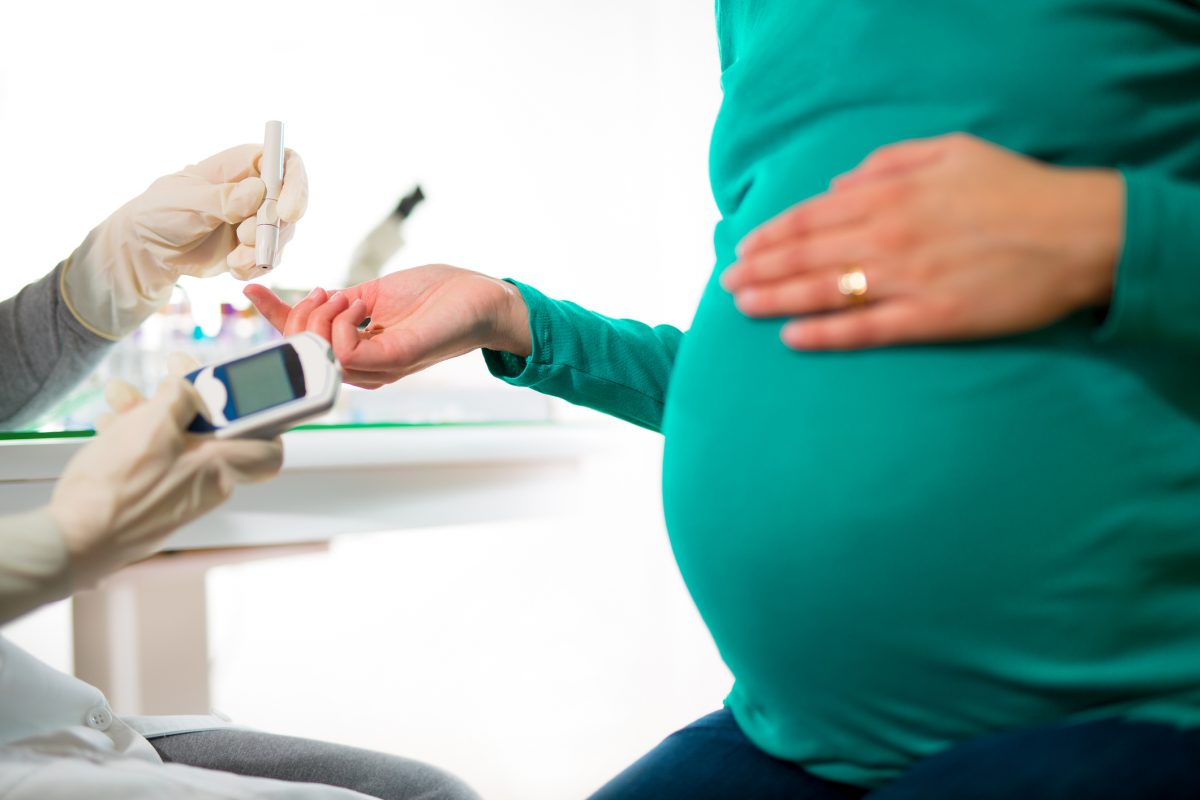DiabeNo
Management of Gestational Diabetes
Some hormonal imbalances lead to the buildup of sugar in the blood which in medical terms is known as ‘GESTATIONAL DIABETES’. Feeling fat lasts for nine months but the joy of motherhood lasts for a lifetime. The period from conceiving till delivery is long and tedious for any mother as the body goes through various levels of transformation. The three trimesters are crucial for the development of the baby and the well-being of the mother. Let us know more about gestational diabetes, their causes, symptoms, and management.
What is Gestational Diabetes?
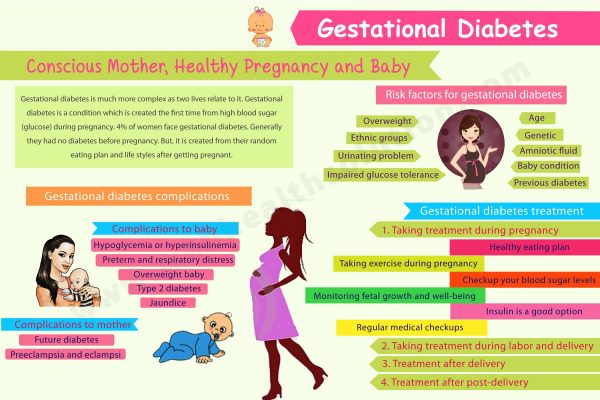
Like Type 1 and Type 2 diabetes, gestational diabetes causes the blood sugar level to rise abnormally. Gestational Diabetes is diagnosed during pregnancy only. If the body does not produce insulin sufficiently, too much glucose enters the blood cell instead of being converted into energy. When you are pregnant, your body becomes more resistant to insulin and more glucose is available to nourish your baby.
The body needs extra insulin to process excess glucose in blood and puts a pressure on the pancreas to secrete accordingly. However, the pancreas fails to produce additional insulin during pregnancy and leads to a spurt in blood sugar level. This condition leads to Gestational Diabetes.
Who are at the risk of getting Gestational Diabetes?
Around 5 to 10 percent pregnant women are at a risk of getting gestational diabetes. You may develop gestational diabetes if you
- Are obese with higher BMI
- Are glucose intolerance
- Have PCOS (Polycystic Ovarian Syndrome)
- Gestational diabetes during previous pregnancy
- Previously delivered a baby 5 Kgs and above before.
- You are 35 years of age
- Family history of Diabetes
- Ethnicity
- A stillbirth of the previous pregnancy
- High Blood Pressure
Symptoms of Gestational Diabetes
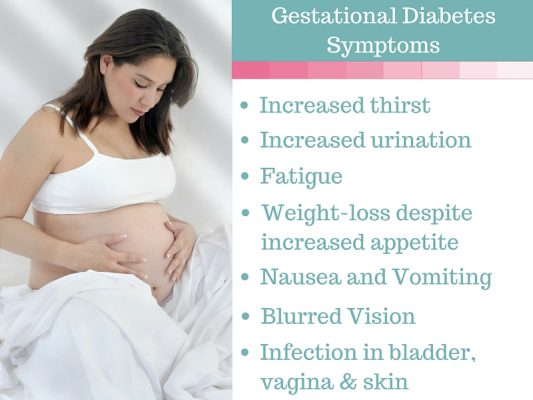
In most cases, there are no specific symptoms or signs of Gestational Diabetes. Sometimes you start to show signs the same as Pre-Diabetes and Type 2, which is feeling thirstier, pee may increase, mouth gets dry, develop infections more often, and blurry vision. As part of the prenatal care, your doctor will evaluate periodically the blood sugar levels. You are most likely to develop gestational diabetes during the third trimester.
In case your doctor finds variations in the blood sugar level, he may refer you to an endocrinologist or a dietician to ensure normalcy in blood sugar levels post-pregnancy. If the reports confirm that you have gestational diabetes, it is better to check your blood sugar levels more frequently.
Does gestational diabetes lead to complications during pregnancy?
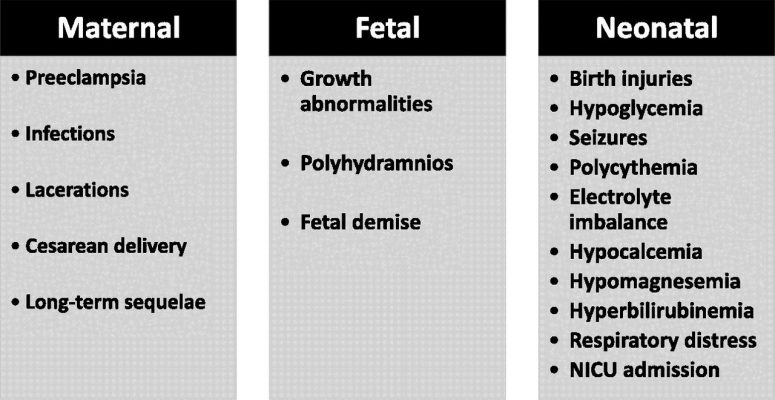
There is no need to worry if you have gestational diabetes provided you carefully manage your uncontrolled sugar levels. There may be a few complications you and your baby will face such as:
- Higher Birth Weight: Additional glucose levels in your blood cross the placenta thereby enabling baby’s pancreas to produce extra insulin. This causes the baby to gain weight and grow large. In such situation, you are at higher risk to undergo a C-section birth.
- Pre-term birth risks: An increase in blood sugar level may increase the risk of delivering the baby earlier than the due date. The doctors may suggest early delivery if the baby has gained excess weight than required. Babies born to moms with gestational diabetes are likely to suffer from respiratory disorders as their lungs are not matured sufficiently.
- Hypoglycemia (Low Blood Sugar): Mothers with gestational diabetes tend to develop low blood sugar post delivery as their body is producing additional insulin. In extreme cases, hypoglycemia can lead to seizures in the baby. But prompt feeding and intravenous glucose solution can bring back normalcy in baby’s blood sugar level.
- Risk of Type-2 Diabetes: Gestational Diabetes can be a warning sign of Type-2 diabetes later in life. Also chances of having gestational diabetes during future pregnancies increases. However, if you retain your ideal weight post-pregnancy, fewer chances of having Type-2 diabetes in future.
Diagnoses of Gestational Diabetes
The normal screening procedure to diagnose Gestational Diabetes is as below-
- Initial Glucose Test: The mom-to-be will be a given a sugary drink. An hour later, your blood samples will be taken for scrutiny. A blood sugar level below 130 to 140 milligrams per deciliter (mg/dl) is usually considered normal. If it is above the required parameters, it only means you are at higher risk of gestational diabetes.
- Follow-up Glucose Tolerance Test (GTT): Here, you are required to fast overnight and your blood samples will be tested in the morning. After that, you will be given a sweet drink containing higher levels of glucose. Your blood sugar test will be conducted after every 2 to hours. If there are high variations found in the examination, then you are more likely to be diagnosed with Gestational Diabetes.
Treatment of Gestational Diabetes
After having confirmed through various tests that you have gestational diabetes, your doctor will chart a health plan which will include as follows.
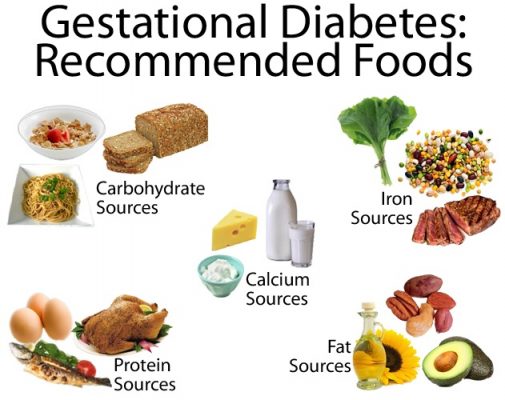
- A balanced meal plan: Going on a diet is not recommended during pregnancy. However, you may have to curb your carb intake to control the rising sugar. Your nutritionist will lay down a healthy meal guide to enrich you and your baby with essential vitamins, minerals, proteins, and fats.
- Regular exercise is a must: At least two and half hours a week of moderate exercise is recommended to use the insulin efficiently. Yoga offers excellent poses during pregnancy which ensures smooth delivery and total health solution. Some of the yoga poses that need to be practised are pranayama, vajrasan, and sethubadhasna. Other forms of physical activities that regulate blood sugar are walking and swimming.
- Regular medical check-ups: During pregnancy, regular medical check-ups are mandatory. Your doctor will screen you for fetal development frequently towards the last trimester. If you are having gestational diabetes, you will be required to check blood sugar levels every 15 days to avoid any complication during delivery.
There is no need to take stress if you have gestational diabetes. In most cases, delivery has been normal without any harm to the baby and the mother. Just ensure to eat a balanced diet and keep fit and fine physically and emotionally. Be happy and enjoy the nine months of the divine feeling of life growing within you. Share if you agree.


